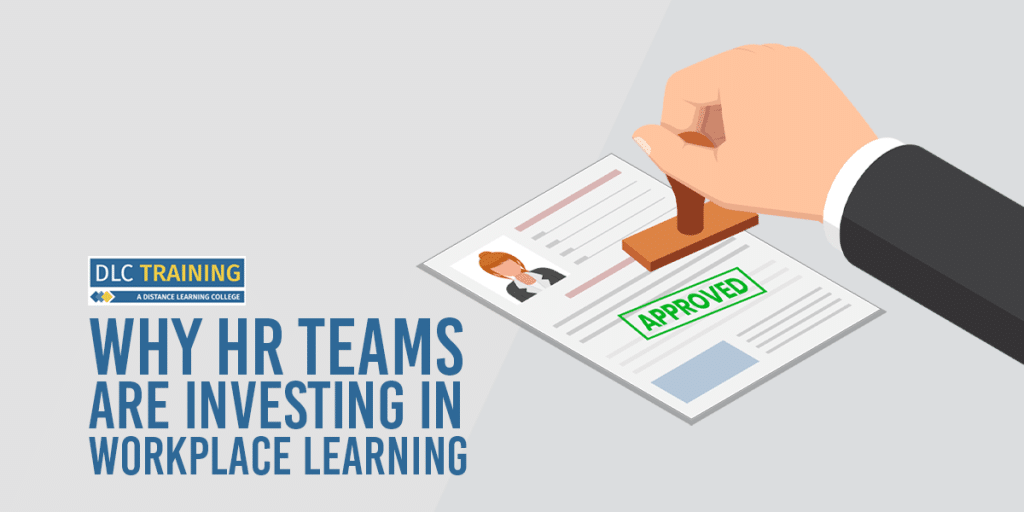The role of HR professionals has significantly evolved in recent years, with an increasing focus on workplace learning. This isn’t just a phase – it’s a growing need that isn’t showing any signs of slowing. In this blog, we’ll look at the key reasons for this shift towards workplace learning and why it’s important.

What is Workplace Learning?
Workplace learning is at the heart of Learning and Development (L&D), a key aspect of a HR professional’s role. It involves gaining new skills and knowledge, with the support of an employer, to improve job performance. This can include specific and targeted learning through mentoring and workshops, to broader skill development through gaining qualifications.
The key reasons why HR teams are investing in workplace learning include:
- Employee Retention and Engagement
- Skill Gaps
- Online Learning
- Employee Experience and Wellbeing
- Leadership Development
Employee Retention and Engagement
Workplace learning has a significant impact on an employee’s decision on whether or not to stay in their role. A Pew Research Center survey found that a lack of opportunities for career advancement was the second largest reason for employees’ leaving their jobs, following closely behind salary expectations. A lack of opportunity leaves employees without any sense of direction in their careers. If employees’ take their careers seriously, they are likely to need this sense of direction in order to drive their work motivation and engagement. Without it, these employees are more likely to look elsewhere for better opportunities. Because of this, workplace learning is a crucial factor for employees when choosing whether or not to stay with a company.
Skills Gaps
As industries evolve, especially with technology, market shifts, and changing consumer demands, new skills are often required to remain competitive. If organisations’ aren’t investing in employee workplace learning, they are more likely to face skill gaps which can hinder productivity, innovation, and overall growth. By prioritising L&D, organisations can ensure they remain agile, enabling them to thrive in an ever-changing landscape.
Online Learning
With the rise of online learning, HR professionals now have more scope in terms of what they can offer their employees. With personalised, on-demand learning at its core, online education allows employees to engage in professional development without disrupting their work. This flexible approach reduces the commitment required while also enabling employees to build their skills at their own pace. Because online courses are so accessible, it’s much easier for HR to support their employees’ growth.
Employee Experience and Wellbeing
HR’s role in promoting employee wellbeing has expanded to include mental health and work-life balance. As development opportunities can improve job satisfaction and morale, L&D initiatives are becoming an essential part of HR, offering employees the tools and growth opportunities they need to thrive both personally and professionally. Moreover, these initiatives help retain top talent while building a culture of continuous improvement, ultimately benefitting the organisation.
Leadership Development
As companies strive for better leadership at all levels, HR professionals are focusing on developing leadership skills among employees. Recognising that strong leadership is needed for organisational success, HR is increasingly investing in programmes that help individuals to lead effectively. Leadership development programmes have become an essential part of HR’s L&D strategy, not only to ensure succession planning and sustainable growth but also to foster a culture of innovation and adaptability within the organisation. These initiatives help create a pipeline of talent ready to take on key leadership roles. This ultimately ensures continuity and stability while aligning with long-term business objectives.
The Importance of Workplace Learning
The integration of workplace learning into HR strategy has become indispensable, as it directly contributes to both the personal success of employees and the long-term growth of the organisation. In a dynamic business landscape, investing in workplace development ensures competitiveness and adaptability. Additionally, continuous learning helps employees gain new skills and stay current with industry trends. Employees who feel their development is valued are more engaged, leading to higher job satisfaction and better retention, while also creating an agile workforce ready to tackle future challenges.
Want to learn more about investing in your employees’ development? Contact the DLC Training Business Team today. They’ll be happy to provide you with advice and guidance to support your employees’ development and your organisation’s success.